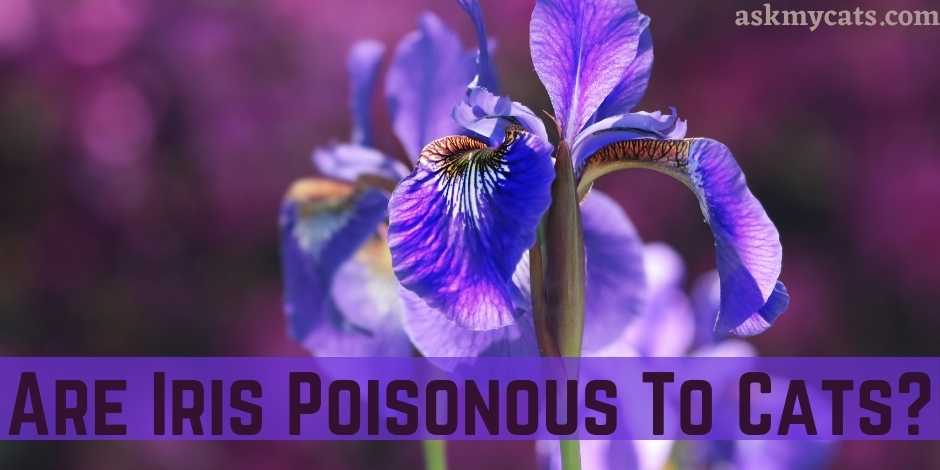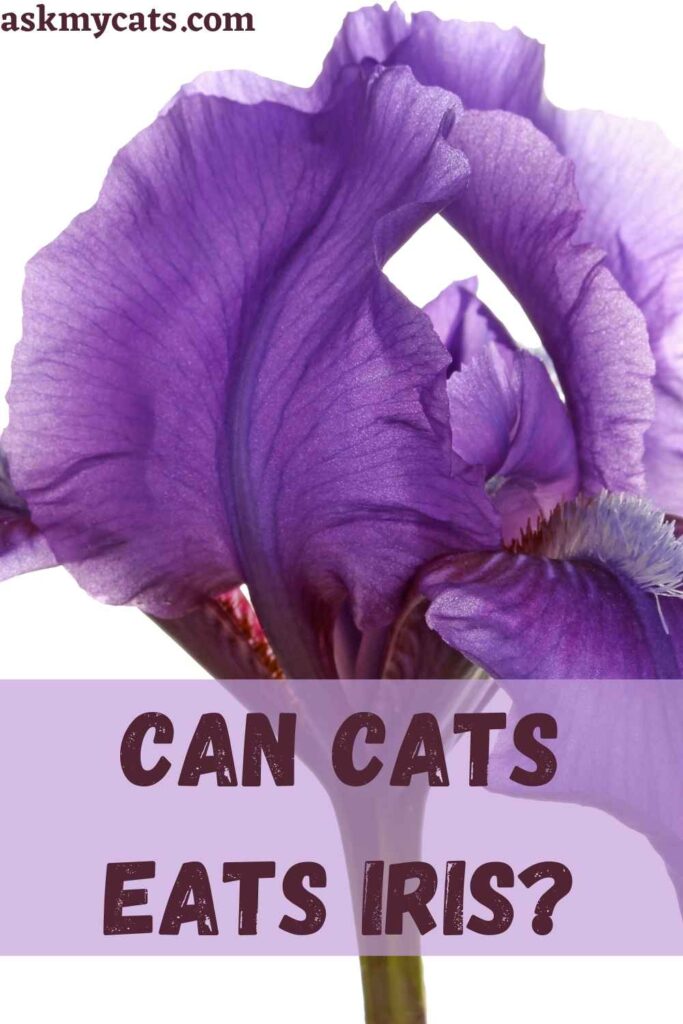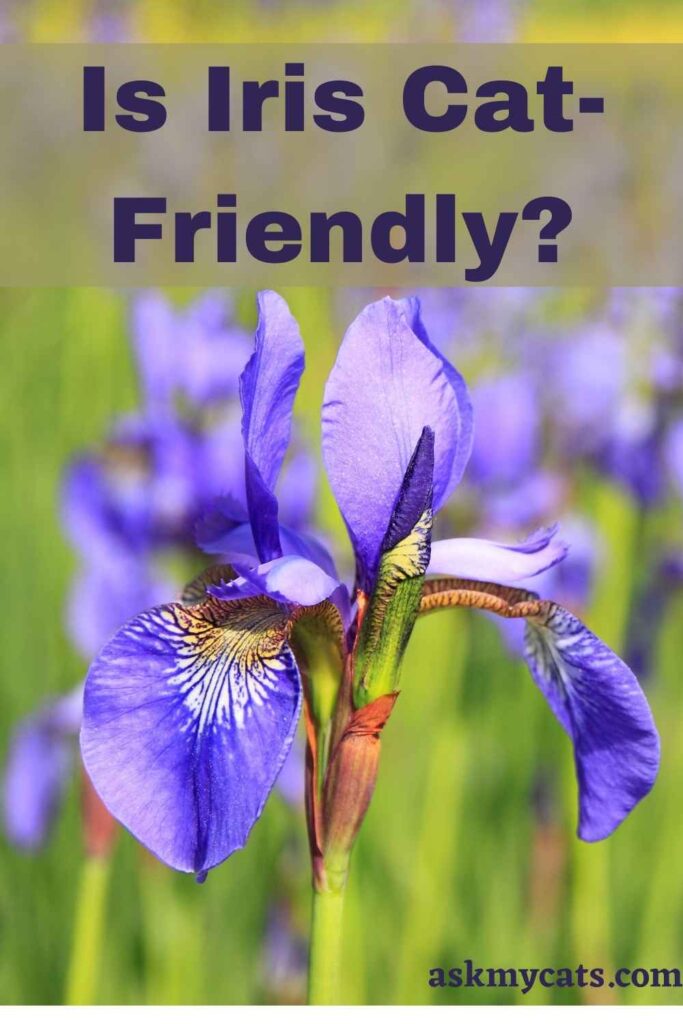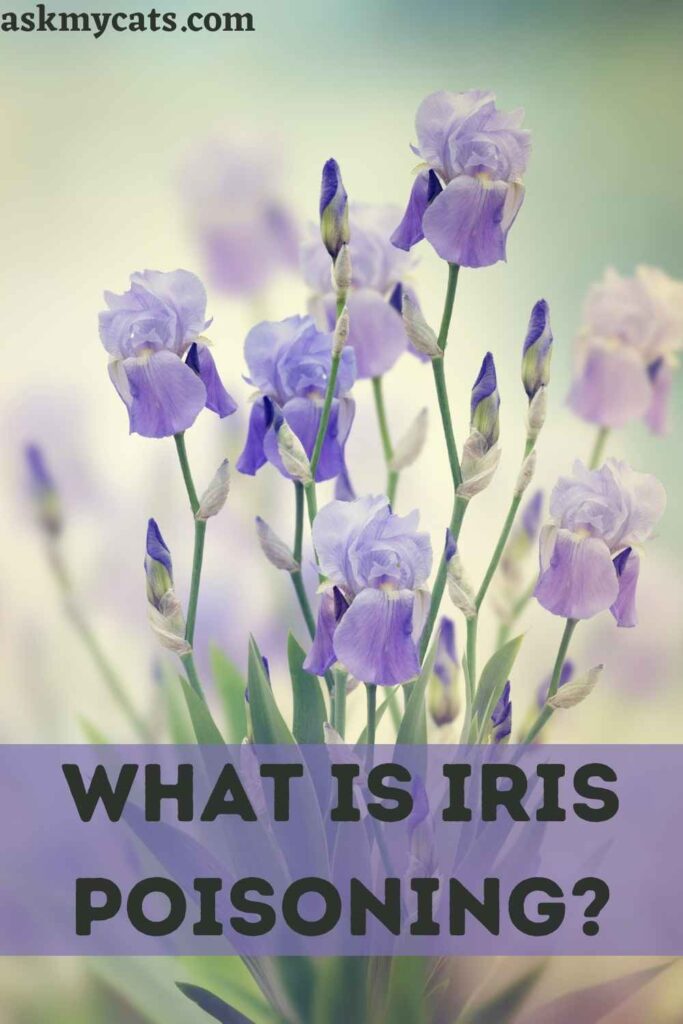Indoor plants, with their lush flowers and foliage, add more beauty and comfort to our homes and offices than anything else. To mention a few, there is a living room, a bedroom, and a bathroom where houseplants look beautiful. There isn’t a space in the house where a houseplant won’t brighten things up.
Bringing plants into your home is not only attractive to the eye, but it may also be beneficial to your health. Some plants, however, are poisonous to your feline companion.
So, are iris poisonous to cats?
Yes, iris are poisonous to cats. Irises are harmful to cats, according to the ASPCA. While we can’t deny their beauty, these colourful blooms can cause tissue irritation if your cat swallows or touches them. Iris poisoning in cats, on the other hand, is usually just mild to moderate in severity.
Keep reading this article to know how you can keep your cats away from the iris plant.


Give Your Cat the Perfect Day
Get the Free Ebook!
What Is Iris?
Iris is a genus of 260–300 species of flowering plants with showy flowers. It takes its name from the Greek word for a rainbow, which is also the name for the Greek goddess of the rainbow, Iris.
According to some sources, the name refers to the vast range of bloom hues found among several species.
Iris is a common name for all Iris species, as well as several belonging to other closely related genera, in addition to having the scientific name.
Some species are known as ‘flags,’ whereas the plants of the Scorpiris subgenus are known as ‘junos,’ especially in horticulture. It’s a well-liked garden flower.
Iris presently includes the monotypic genera Belamcanda (blackberry lily, I. domestica), Hermodactylus (snake’s head iris, I. tuberosa), and Pardanthopsis (vesper iris, I. dichotoma).
Irises are perennial plants that develop from rhizomes (rhizomatous irises) or bulbs (in dry regions) (bulbous irises).
Their flowering stems are long and erect, and they can be simple or branching, solid or hollow, flattened or circular in cross-section. 3–10 basal sword-shaped leaves occur in dense bunches on the rhizomatous species. The basal leaves of bulbous species are cylindrical.
Three sepals, three petals, and three large pollen-receptive stigma branches, under which the pollen-producing anthers are hidden, are typical features of the flowers.
The more erect inner petal-like floral segments in irises are termed standards, while the normally drooping outer ones are called falls.
These floral pants are found above the ovary (inferior ovary), which is made up of three carpels that are joined together to form a single pistil. The ovary grows into dry capsule fruits, and the ovules within the ovary section become seeds.
Can Cats Eats Iris?
No, cats cannot eat iris as they are poisonous according to ASPCA.

The iris is a favourite perennial in many home gardens because it is both colourful and durable.
The iris, also known as bearded iris, snake lily, and yellow flag, is noted for adding beauty to any garden bed.
Are they, however, safe for our pets? Is it true that iris is harmful to cats?
Irises are, unfortunately, harmful to both dogs and cats. Although iris poisoning is rarely fatal in cats, if consumed or touched, the flower can cause significant harm.
Irisin is the principal poisonous chemical that causes these undesirable side effects.
Irisin can be found throughout the plant, although it is concentrated in the bulbs and rhizomes, or underground stems.
Plants in the Iridaceae family have the highest concentration of toxins in their bulbs, according to the Pet Poison Helpline, making these flowers extremely dangerous to cats who like to dig.
The answer is yes, in a nutshell. Both cats and people are poisoned by the iris plant.
It will, however, cause no significant harm to you or your pets. The vast bulk of what you’ve heard about the facility is untrue.
Although the iris plant is not poisonous, you should use caution when around it.
Obstruction of the throat in cats is unusual, according to experts at the ASPCA Animal Poison Center, and most cases of poisoning recover within 24 hours.
Clean the cat’s mouth with water or milk if feasible, but seek a veterinarian if the situation appears to be serious. Keep iris out of cats’ reach. Pick up any fallen leaves and discard any clippings while pruning the plant.
Is Iris Cat-Friendly?
No, iris is not cat-friendly.

The poisons aren’t especially damaging, but if the cat swallows a significant amount, they can be unpleasant and distressing.
Iris may irritate your cat’s skin, and she may develop an allergic reaction if she rubs against them or rolls about in them.
She may begin to slobber profusely. If she swallows bits of the plant, she may become unwell or have diarrhoea.
Your cat may vocalize and fuss to attract your notice because eating iris plants that can induce stomach distress in cats.
She may perhaps go somewhere quiet to soothe her aching stomach.
If this happens, you’ll have to find her and get her medical care; she’ll also most likely dirty her hiding place, generating a series of problems for both her and you.
Some people believe it’s a good idea to try to promote or induce vomiting if your cat has eaten iris or other poisonous plants.
Iris poisoning is usually more bothersome than dangerous. Unlike other hidden dangers (such as peace lilies and hyacinths), iries are unlikely to cause long-term harm, and I’m not aware of any cats that have died after eating them.
The poisoning’s consequences, on the other hand, can induce dehydration, which is harmful to your cat’s health.
Experts strongly advise you to have your cat inspected by a veterinarian; she may have eaten something more dangerous than iris, among other things.
Poisoning from more dangerous plants can have similar symptoms at first. If something goes wrong, your cat will be in good hands with a medical professional who knows just what to do.
Nobody wants to think their cat ate something bad. Iris poisoning usually only causes modest symptoms, but the more a cat consumes, the worse it becomes.
The best method to keep your cat from being bothered by iris is to keep them away from them.
All parts of an iris are poisonous to your cat. Your cat will very probably grow irritated if it chews the stalk or the bloom itself.
Nobody wants to think their cat ate something bad. Iris poisoning usually only causes modest symptoms, but the more a cat consumes, the worse it becomes.
The best method to keep your cat from being bothered by iris is to keep them away from them.
All parts of an iris are poisonous to your cat. Your cat will very probably grow irritated if it chews the stalk or the bloom itself.
What Is Iris Poisoning?
If your cat ate iris and is showing symptoms like vomiting and nausea it is known as iris poisoning.

Irises are flowering plants with enormous, ruffled flowers on stiff green stalks that come in a range of varieties and colour variations.
While many people like growing iris in their gardens or using it as a cut flower in a vase indoors, the plant is harmful to your cat.
Iris poisoning is normally mild to moderate in nature, but if left untreated, it can cause considerable discomfort and injury to your cat.
All parts of an iris are poisonous to your cat. Your cat will very probably grow irritated if it chews the stalk or the bloom itself.
If you suspect your cat has eaten a poisonous plant or flower, see your veterinarian as soon as possible.
Symptoms Of Iris Poisoning In Cats
The severity of iris poisoning symptoms varies depending on the part of the plant consumed, the amount consumed, and the size of your cat. Iris poisoning symptoms can appear as soon as two hours after consumption. If your cat has eaten some of these flowers, keep an eye out for the following clinical signs of iris poisoning: –
- Vomiting
- Nausea
- Abdominal Pain
- Diarrhea
- Ulcers of the mouth
- Skin irritation, also called dermatitis
If you have a strong suspicion that your cat has eaten an iris (or several irises…), don’t wait for symptoms to appear: act quickly and contact your veterinarian. If treatment is required, the sooner you begin, the better your pet’s prognosis.
Flag flowers and flag plants are other names for irises. While innocuous to humans, irises contain a glycoside known as iridin, irisin, or irisine.
Each of these chemicals is irritating to cats and can result in a variety of symptoms. The compounds are found in the highest concentrations in the plant’s rhizomes, roots, and bulbs.
The leaves, flowers, and stems are all poisonous. Iris bulbs should be kept out of reach of curious cats, particularly kittens, who are prone to chewing or biting items out of natural curiosity.
How To Diagnose Iris Poisoning In Cats?
To diagnose iris poisoning in cats take her to your vet as soon as possible.
A complete physical exam will be performed by your veterinarian to begin the diagnosis of iris poisoning in your cat.
Poisoning is difficult to diagnose because the symptoms may appear similar to those of other medical conditions at first.
You must provide your veterinarian with a complete physical and medical history of your cat. Furthermore, if you see your cat chewing or eating a plant, or if they come into contact with a plant, you should give a sample to your veterinarian.
This will enable your veterinarian to determine which compounds your cat has been exposed to.
During this exam, your veterinarian will look for ulcers in your cat’s mouth. In some cases, your veterinarian may want to examine your cat’s throat to look for additional ulceration.
This may necessitate seizing your cat in order to insert a small camera that will provide your vet with a complete view of your cat’s airway and oesophagus.
How To Treat Iris Poisoning In Cats?
To treat iris poisoning in cats take her to your vet immediately so the treatment could begin as soon as possible.
Once your cat has been diagnosed with iris poisoning, your veterinarian will start treatment with a variety of procedures.
First, your vet will try to relieve any immediate discomfort your cat is experiencing with lavage or by washing its mouth and oesophagus.
This entails putting water or another harmless liquid into their mouth to rinse away any remaining traces of the iris and to stop any ulceration.
Your veterinarian will then induce vomiting in your cat. This is accomplished by administering a 3 percent hydrogen peroxide solution to your cat.
This is not harmful to your cat in this small dose, but it will cause them to vomit anything that remains in their stomach.
Your veterinarian will closely monitor your cat after they have induced vomiting because there is a risk of choking or aspiration pneumonia from this procedure.
Finally, your veterinarian will give your cat activated charcoal. Activated charcoal is extremely absorbent and is not digested by your cat’s digestive system.
When administered orally into the stomach, the charcoal will absorb any remaining compounds and safely pass through your cat’s system.
Frequently Asked Questions
What to do if my cat has eaten or touched an iris?
First and foremost, do not panic. Keep in mind that veterinary intervention isn’t always necessary in these situations, especially if your cat only ingested a small amount of the plant. Remain calm, clean any plant matter from your cat’s mouth and fur, and contact your veterinarian. Even though iris poisoning is rarely fatal in cats, you should contact your veterinarian for further guidance. If treatment is necessary, the sooner you begin, the better. If possible, tell your vet which part of the flower your cat ate and how much he ate. Better yet, bring a sample of the plant into the clinic to assist your veterinarian in determining its level of toxicity. A quick snapshot on your phone will also suffice.
How do cats recover from iris poisoning?
The prognosis for your cat’s recovery from iris poisoning is generally favorable. If your cat has been poisoned, he or she should be monitored in your veterinarian’s office overnight or for several days, or for as long as serious symptoms persist. You will need to take your cat to the vet for follow-up visits to ensure that they are healing properly. If vomiting was induced, you will need to keep a close eye on your cat for signs of aspiration pneumonia. Fever, coughing, raspy breath, and general lethargy are all possible symptoms. Most cats will recover completely from iris poisoning with proper veterinary care and plenty of rest and fluids.
Are iris flowers poisonous?
Irises and allied plants are found in over 200 species. The whole plant is poisonous. Iris toxicity is usually moderate in people, but it can cause significant disease and death in pets and animals. The severity of iris poisoning in pets depends on the amount of exposure and whatever portion of the plant was consumed.
Final Words
While irises are nice to look at, if you have a cat, you should avoid bringing them inside your home. Cats are inquisitive creatures who must explore everything they come across. There are no exceptions when it comes to flowers and plants.
Ask us questions in the comments section if you have any.
